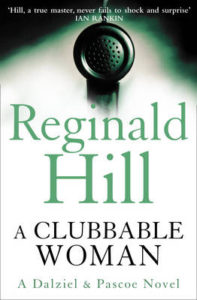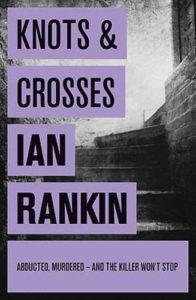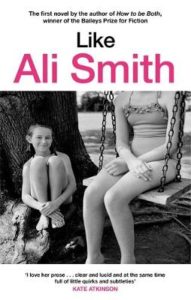Decades: Compiling the Ultimate Library with S.G. MacLean
It is time to catch up with my Decades Library again. This week the Decades Curator Hat is passed to Shona MacLean who has selected five new books that she wants me to add to my ever-growing collection of umissable reads.
When making nominations for the books I must add to my Decades Library my guests cannot just pick their five favourite books. I ask them to follow two simple rules:
1 – You can select ANY five books
2 – When making selections you can only select one book per decade from five consecutive decades – this means choices can come from any fifty year span.
Flexing of the rules and name-checking books which narrowly missed out seems to be fairly common practice and Shona has thrown subtlety to the wind to give some nice bonus mentions.
Time for me to step back and let Shona take you through her selections.
 S.G. MacLean (Shona) was born in Inverness and grew up in various small Highland villages where her parents were hoteliers. One of five children, she learned to appreciate the virtues of peace and quiet and taking to her room with a good book at a young age. Her own nest of 4 children is about be emptied, which will leave more time to concentrate on the world’s neediest dog. After an M.A. and Ph.D. in History from Aberdeen University, she began writing historical crime novels while the children were bringing themselves up.
S.G. MacLean (Shona) was born in Inverness and grew up in various small Highland villages where her parents were hoteliers. One of five children, she learned to appreciate the virtues of peace and quiet and taking to her room with a good book at a young age. Her own nest of 4 children is about be emptied, which will leave more time to concentrate on the world’s neediest dog. After an M.A. and Ph.D. in History from Aberdeen University, she began writing historical crime novels while the children were bringing themselves up.
She currently has two series in print – The 4 book Alexander Seaton series, set mainly in the 1620s and 30s in the north-east of Scotland, and the 5 book Damian Seeker series, set mainly in the 1650s England of Oliver Cromwell. Her first book, The Redemption of Alexander Seaton (2008) was longlisted for the Desmond Elliot award and shortlisted for the Saltire 1st Book award and the CWA Historical Dagger. All of the Seeker books have either been longlisted or shortlisted for the CWA Historical Dagger, 2 of them – The Seeker and Destroying Angel winning it, and two – The Bear Pit and The House of Lamentations also being longlisted for the Gold Dagger. The Bear Pit was also shortlisted for the Blairgowrie Festival Book of the Year award in 2020.
Amongst the framed photos on Shona’s bookshelves are two of her late uncle, bestselling novelist Alistair MacLean, who looks over her shoulder with a wry smile.
Instagram @iwritemybike2 Twitter @SGMacLeanauthor
Books available from all good bookshops and uk.bookshop.org/shop/S_G_MacLean
DECADES
Okay, here are my choices. This was extremely difficult because some of my favourite and most influential books were published centuries apart, and others crowding into the same decade. Anyway, I may sneak a couple of them in in the subtext. (There will be asterisks, thus: *). The one book I was absolutely determined to get in was published in the 2000s, so I’ve built my list around that, stretching back from there to the decade in which I was born (1960s). All of these books are high quality reads and well worth a place on the shelves.
So:
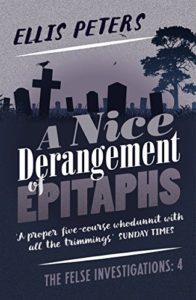 1960s: Ellis Peters, A Nice Derangement of Epitaphs
1960s: Ellis Peters, A Nice Derangement of Epitaphs
What can I say about Ellis Peters’ Brother Cadfael Chronicles? I first discovered them in my late teens ad I couldn’t believe there were books which combined two of my greatest reading pleasures – History and Crime Fiction. I loved that canny, all-too-human Welsh monk and his wonderfully-recreated C12th world. I still listen to the radio programmes starring the inimitable Derek Jacobi. Ellis Peters was for me the absolute trailblazer of my genre. You’re supposed to pretend you don’t mind about winning awards, but when I started writing, it was my dream to one day win the Dagger that had first been instituted in her honour.
1970s: Reginald Hill, A Clubbable Woman.
Oh, Dalziel and Pascoe – mismatched, again thoroughly human, and brilliant. These books are so well-written, so intricate and intelligent, such consistent page-turners. But I would be lying if I said I’d read the books first. I saw the TV show first – was there ever anyone as magnificently right in a role as Warren Clarke? (although my friend Fiona, who urged me to read the books, assured me he was not disgusting enough). To me, Andy Dalziel has at last found his heir in Mick Herron’s Jackson Lamb.* quietly sneaking in another favourite. In my first year at Harrogate, I was introduced to Reginald Hill. I could hardly believe it, and had nothing remotely sensible to say to him. What a lovely gentleman he was.
1980s: Ian Rankin, Knots and Crosses
I think Tartan Noir is a lazy term, and does none of us any favours, apart from to allow for a comforting kind of kinship when Scottish crime-writers find themselves away from home. Having said that, for me, Ian Rankin broke a mould I hadn’t known existed; several moulds, in fact. Here was well-written, intelligent crime fiction set in Scotland (I’d somehow missed Macillvanney as a crime writer, but happily got him the next time around, and again was lucky enough to meet him at my first Bloody Scotland. “Hello, I’m Willie,” he said, as I tried not to pass out. Another absolute old school gent.) Rankin’s ‘place’ – Edinburgh, and his character John Rebus, breathed reality, breathed authenticity, and were absolutely engaging for it. With no disrespect intended to any predecessors whose work I might have missed, I have the sense that from then on, Scottish crime writing began to build, to be taken seriously, and for that many of us need to be grateful.
1990s: Ali Smith, Like
Oh, do I love Ali Smith! Oh did I go up to her at Ness Book Fest a few years ago and completely fan girl and burble at her about how much I loved her writing and how much it meant to me, and how of all her work it was Public Library and Other Stories that meant the most to me, because it reminded me of my childhood, and our village library in Muir of Ord, and my Dad and all sorts of things? And she told me that her first novel, Like, was the most her, the most about growing up in Inverness. And so I bought it and I read it and I loved her even more. Which is why my choice for the 1990s isn’t, after all, James Kelman and How Late it was, how Late. * see what I did there?
2000s: James Robertson, The Testament of Gideon Mack
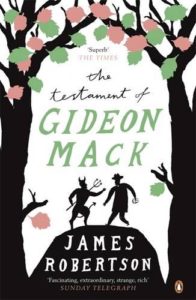 Practically any one of James Robertson’s books is the kind of book that makes me think I should give up writing, because I have not a hope of coming anywhere near him as a writer. His ear for dialogue, for the Scots tongue, is perfect. His characters, at times, are the heirs of the finest characters in Walter Scott; Baillie Nicol Jarvie would not find himself out of place in a James Robertson novel. The Testament of Gideon Mack being longlisted for the Booker Prize brought this brilliant writer to greater prominence. I think had the judges understood Scottish literature better, had they read Hogg’s Private Memoirs and Confessions of a Justified Sinner* or Stevenson’s Master of Ballantrae*, then Robertson, with this deep, C21st century dive into the Scottish psyche, would not have stopped at the longlist. I stalked him out of an event at Ullapool once, and thrust the book at him to be signed. We are both on the programme for the Blairgowrie festival in a few weeks time, so I fervently hope he has forgotten this.
Practically any one of James Robertson’s books is the kind of book that makes me think I should give up writing, because I have not a hope of coming anywhere near him as a writer. His ear for dialogue, for the Scots tongue, is perfect. His characters, at times, are the heirs of the finest characters in Walter Scott; Baillie Nicol Jarvie would not find himself out of place in a James Robertson novel. The Testament of Gideon Mack being longlisted for the Booker Prize brought this brilliant writer to greater prominence. I think had the judges understood Scottish literature better, had they read Hogg’s Private Memoirs and Confessions of a Justified Sinner* or Stevenson’s Master of Ballantrae*, then Robertson, with this deep, C21st century dive into the Scottish psyche, would not have stopped at the longlist. I stalked him out of an event at Ullapool once, and thrust the book at him to be signed. We are both on the programme for the Blairgowrie festival in a few weeks time, so I fervently hope he has forgotten this.
Five wonderful books which I am thrilled to add to my Decades Library. I also read the Cadfael novels in my late teens and Dalziel and Pascoe were not far behind. As I worked in the largest bookshop in the Highlands at the time Shona was reading her way through the Ellis Peters books I would like to believe there is a possibility I may have sold her some of the books which helped influence these Decades choices.
Also Muir of Ord Library was MY library when I was a teenager – how lovely to have it remembered all these years later. I can still remember the smell of books which hit you as you pushed open the library door.
DECADES WILL RETURN
